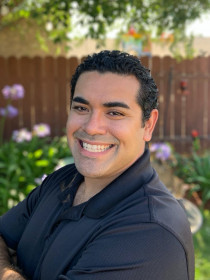
Mario Alberto Espinoza-Kulick
Connect with Mario Alberto
About Mario Alberto
Espinoza-Kulick’s research focuses on health policy, immigration, race, ethnicity, Indigeneity, and social movements. Through the framework of decolonial-inspired methods, his research produces relevant scholarship in collaboration with community, highlighting evidence for equitable policy change. Overarching themes in Espinoza-Kulick’s writings include advocacy strategies that transform health policy, cross-sectoral collaboration, and unequal healthcare access among Latinx immigrants. Espinoza-Kulick serves on the Boards for Corazón del Pueblo: The Cultural and Creative Arts Center of the Santa Maria Valley, and Access Support Network.
Contributions
Guía de Promoción de Políticas
Equidad en Salud
Latinx Community Survey Evidence for California Healthcare Bills
Policy Advocacy 101 Toolkit
In the News
Publications
Builds on research with local community leaders and agencies to put forward a model for inclusive health care delivery that includes multilingual access and structurally competent providers.
Conceptualizes what I call, “movement pandemic adaptability,” drawing from a decolonial-inspired study including participant-observation (September 2018–September 2020), interviews (n = 31), and focus groups (n = 12) with community members and health advocates. Data collection began before the COVID-19 pandemic (September 2018–February 2019) and continued during its emergence and the initial shelter-in-place orders (March 2019–September 2020).
Documents health disparities facing heterogenous Latinx Immigrant and Indigenous groups and analyzes immigrant health advocacy strategies.
Brings you the voices of twenty-one graduate students from across the disciplinary spectrum. Discussses what drives them to pursue their research, their personal journeys that brought them to UCSB, and what they hope their work will accomplish.
Tells the history of the Marijuana Policy Project, focusing on how issues of race and health shaped their formation and ongoing advocacy work.
Provides a comprehensive overview of the existing research on "ethnic enclaves," which has been deployed to understand concentrated areas of residential segregation and minority business ownership.
Describes the formation of a HIV/AIDS awareness, testing, and prevention program that was piloted at California Polytechnic State University, San Luis Obispo. The findings demonstrate how to create an effective community-based program, and the "Know Your Status" event has been adopted annually
Describes the crisis of health facing Latinx immigrant communities on California's Central Coast, highlighting major concerns for policymakers and community stakeholders.
Analyzes interviews from the ACT UP Oral History project. Demonstrates how organizers in the early days of the HIV/AIDS epidemic used creative, confrontational strategies in order to raise awareness and gain resources for people living with HIV/AIDS.